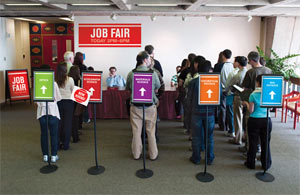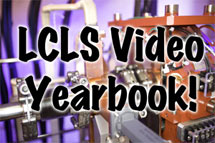

Tuesday - July 6, 2010
SLAC Today is
available online at:
http://today.slac.stanford.edu
In this issue:
A Field where Jobs Go Begging
Reminder: This is LCLS—A Video Yearbook
 |
 |
|
Tuesday - July 6, 2010 |
A Field where Jobs Go Begging (Photo by Reidar Hahn, Fermilab.)
With a growing demand for particle accelerators in science, medicine, and industry, accelerator science is in desperate need of skilled specialists Tony Favale is looking to hire. Business in the particle accelerator world is booming, as is business at Advanced Energy Systems, where Favale is president. His company, with offices in New York and New Jersey, is doing research and design work for the next generation of accelerators, which will be employed in electron lasers for the Navy, radiation detectors for the Department of Homeland Security, and more efficient particle colliders at US national laboratories. But of the seven positions he was advertising in November, three were still unfilled in mid-March because Favale can't find enough qualified accelerator scientists. The shortage is forcing the scientists and engineers he already employs to work overtime. Favale isn't picky; he says he'd be comfortable hiring people with experience in other fields, such as vacuum or radio-frequency technology, and teaching them the accelerator science on the job. "Anybody that's got any of these talents, one of the industries will pick them up tomorrow, so the competition is rough," Favale says. "Right now everyone is fighting for the same people." Renewed government investment in accelerators, combined with a growing number of medical and industrial applications, has produced a flood of design, engineering, research, and development work on the current and next generation of accelerator projects. Yet of the 5915 physics PhDs awarded in the United States in the last five years, only 54 went to people who identified themselves as accelerator physicists, says Roman Czujko, director of the American Institute of Physics' Statistical Research Center. This number does not account for the many physicists who switch to accelerator science later in their careers. The shortage is likely to get worse before it gets better, scientists say. The next generation of proposed projects presents unique technical challenges that will raise demand for accelerator scientists, all while industry recruits top scientists away from national laboratories. Speaking at the Symposium on Accelerators for America's Future in Washington, DC, in October, William Barletta, a physics professor at the Massachusetts Institute of Technology, said expanding the accelerator-scientist workforce in the United States is essential. "These machines are conceived of, designed, built, operated, and upgraded by a few hundred accelerator physicists, a large fraction of them trained outside the US," Barletta said. Read more in Symmetry magazine...  Reminder: This is LCLS—A Video YearbookThe SLAC Communications Office is producing a video yearbook to highlight the people, personalities, stories and successes behind the completion of the first phase of the LCLS and the beginning of a new era of science. From 10 a.m. to 4 p.m. on Wednesday, July 7, and Thursday, July 8, a video kiosk, hosted by Melinda Lee and Brad Plummer, will be set up in the Panofsky Auditorium breezeway with props, coffee and snacks. Please come out and share your thoughts and extend your best wishes for the LCLS as we prepare to mark this milestone event! The videologs will be featured at the August 16, 2010, celebration of the formal dedication of the Linac Coherent Light Source. Questions? Contact Melinda Lee (x8547) or Brad Plummer (x2282). |
Events
Access (see all)
Announcements
|
|
| | ||
|
|
||
 <%
Response.AddHeader "Last-modified", getArticleDate()
'Response.AddHeader "Last-modified","Mon, 01 Sep 1997 01:03:33 GMT"
'Monday, December 06, 2010
%>
<%
Response.AddHeader "Last-modified", getArticleDate()
'Response.AddHeader "Last-modified","Mon, 01 Sep 1997 01:03:33 GMT"
'Monday, December 06, 2010
%>View online at http://today.slac.stanford.edu/. |
||